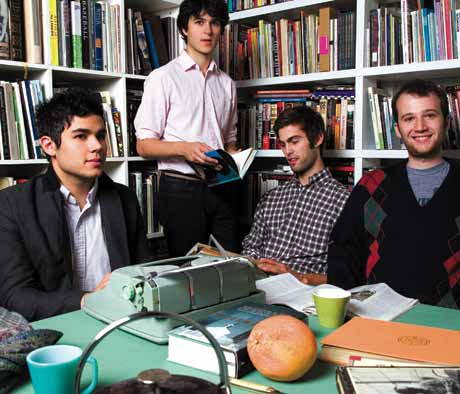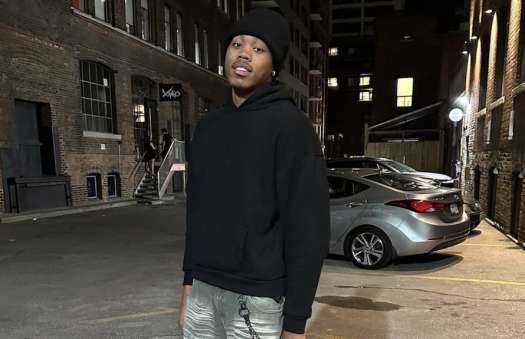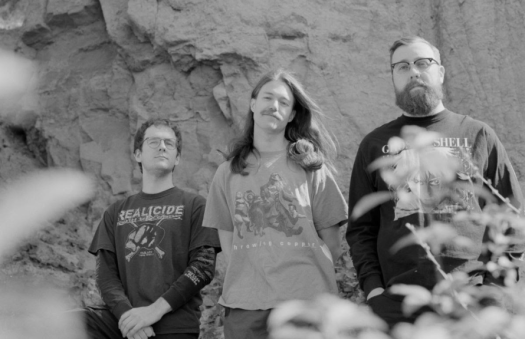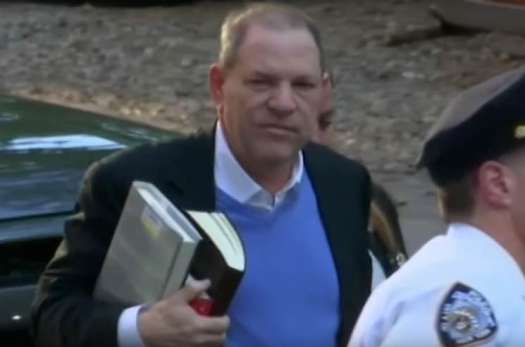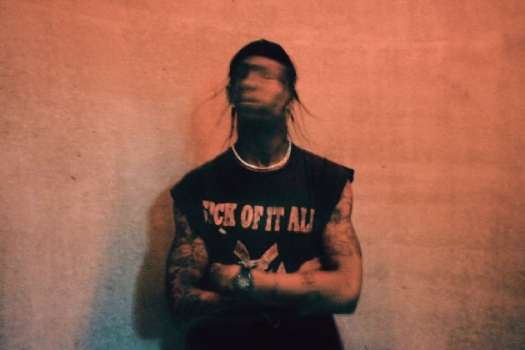"I think we get asked more about African music, the way we dress, and then us going to Columbia. I think those are our three clichés at this point, admits Vampire Weekend bassist Chris Baio with a cocktail of sarcasm and laughter. Acknowledging three clichés the press has been fixating on isn't something the average band is able to do two months before the release of their debut album, but New York's Vampire Weekend have found themselves primed since they became one of indie music's most talked about bands thanks to some endless blog love and touring the world.
If Vampire Weekend are up for addressing their documented clichés though, they should know that they have their top three all wrong. In fact, the first one should be that name of theirs. Are they recovering goths struggling to leave their past behind? Um... not even close. The four graduates of New York's esteemed Columbia University often find themselves being tagged as "prep rock" ("It's sort of funny, we're cool with it, says Baio) and borrowed their name from a film that doesn't even exist. The director? Vampire Weekend's singer/guitarist Ezra Koenig.
"The summer after his first year in college, Ezra decided to make a vampire movie with his friends," Baio offers. "He'd seen Lost Boys and wanted to make a deeper version of it, so he spent two days at home with friends working on it. He forgot about it for a while and found the footage about three years or so later, right when we were starting up the band. So he edited it into a trailer — which is up on YouTube — and called it Vampire Weekend, but that's as far as he got with it. I guess since he found the footage around the time we formed the band, he thought it would be good for the band's name too."
Independent ventures such as this have helped make the band what it is. However, even more vital to the band's character — and one of the key factors in securing a lucrative record deal with XL — was the online distribution of an unofficial, homemade CD. Already legendary in some indie and file-sharing circles, realistically the Blue CD-R, as they called it, should be Vampire Weekend cliché number two. "Blue CD-R was more than a demo, it was more like the working version of our album, explains Baio. "I think the goal of it was to record the songs that we had been playing live for a while. I guess we sort of stopped at that point for some reason and then picked it back up in September, really honed it and made it a finished album."
You could say Blue CD-R was so good they decided to use it as their debut album, which Baio admits is pretty much true, with the exception of some slightly different mixes, a new song and some re-jigging of its sequence. But he says, it wasn't originally in the cards to use the Blue CD-R as such a promotional item. "We actually didn't circulate it," he explains. "We played maybe three shows in New York between February and April where we sold out of the 80 copies we had. And then when we sent it to all of the labels we were talking to, but we never pushed it on anyone that didn't ask for it. It was more that we sold it at some shows and gave it to people who wanted to hear it." MP3 blogs posted it, people downloaded it, and tours with bands like the Shins, Tokyo Police Club and the Dirty Projectors were scheduled. "[The internet] I think definitely helped us. It was cool seeing people at shows singing along to the songs, says Baio.
As Vampire Weekend recognize, it's hard to argue that the "Africanisms" in their music aren't that third cliché. The biggest standout amongst their pristine pop tones and Ivy League witticisms on their self-titled debut album, it's the characteristic that got people downloading, attending shows and singing along in the first place. So much has it become a perpetual cliché for the band that if the four-piece believed every story they read on their music, they'd see themselves as the second coming of Paul Simon's Graceland — a tireless comparison that at times is difficult to dispute. But according to Baio, the classic 1986 album isn't as influential as one would guess. "It's an album that we're definitely all aware of, but we find it kind of reductionist that Graceland becomes the only thing discussed when people talk about our music," confesses the bassist. "I mean, for a lot of people in America it seems to represent a certain sound from Africa, but we listen to so much more than just that, and I think there is also so much more in our music than just the certain African influences we have, y'know."
To the extent that Vampire Weekend feel their music is diversified, they certainly don't try to hide their Afro fixations. By crossing their Manhattan-bred customs with their African inspiration, they branded their sound "Upper West Side Soweto," a term that has stuck and found its way into just about every article or conversation about the band. "I think we all had been exposed to African music before the band started," Baio explains. "There was this compilation we had been listening to a lot that was Madagascarian music made with traditional rock instruments — guitars, bass and drums — but had a sound completely different from your average rock band. [The 1986 Shanachie compilation] Indestructible Beat of Soweto is another record that we've spent a lot of time with too. Even in the car we're always listening to a lot of different albums from various parts of Africa."
Vampire Weekend is not an attempt by four prepsters to make a record that sounds African. "One (Blake's Got A New Face)" may shuffle to a rhythm found mostly in "world music" bins and a song carefully named "Cape Cod Kwassa Kwassa" may be lifted by some adept bongo playing, but the album is as much a product of NYC's fertile indie scene as it is anything else. Fully aware of their abilities, according to Baio, the band chose the album's sound more on what not to sound like. "We certainly talked about things we were going to avoid in our sound," he says. "We always wanted to have clean guitar tones in our music, we definitely didn't want any heavily distorted sounds. There were also drum beats, like dance beats a lot of bands have been doing for a while, that we wanted to avoid. It's danceable but in a way that's different from a lot of the bands that have been coming out of New York for a while. So, there were things we talked about, but they were more things to avoid then things we were actually going to do."
If Vampire Weekend are up for addressing their documented clichés though, they should know that they have their top three all wrong. In fact, the first one should be that name of theirs. Are they recovering goths struggling to leave their past behind? Um... not even close. The four graduates of New York's esteemed Columbia University often find themselves being tagged as "prep rock" ("It's sort of funny, we're cool with it, says Baio) and borrowed their name from a film that doesn't even exist. The director? Vampire Weekend's singer/guitarist Ezra Koenig.
"The summer after his first year in college, Ezra decided to make a vampire movie with his friends," Baio offers. "He'd seen Lost Boys and wanted to make a deeper version of it, so he spent two days at home with friends working on it. He forgot about it for a while and found the footage about three years or so later, right when we were starting up the band. So he edited it into a trailer — which is up on YouTube — and called it Vampire Weekend, but that's as far as he got with it. I guess since he found the footage around the time we formed the band, he thought it would be good for the band's name too."
Independent ventures such as this have helped make the band what it is. However, even more vital to the band's character — and one of the key factors in securing a lucrative record deal with XL — was the online distribution of an unofficial, homemade CD. Already legendary in some indie and file-sharing circles, realistically the Blue CD-R, as they called it, should be Vampire Weekend cliché number two. "Blue CD-R was more than a demo, it was more like the working version of our album, explains Baio. "I think the goal of it was to record the songs that we had been playing live for a while. I guess we sort of stopped at that point for some reason and then picked it back up in September, really honed it and made it a finished album."
You could say Blue CD-R was so good they decided to use it as their debut album, which Baio admits is pretty much true, with the exception of some slightly different mixes, a new song and some re-jigging of its sequence. But he says, it wasn't originally in the cards to use the Blue CD-R as such a promotional item. "We actually didn't circulate it," he explains. "We played maybe three shows in New York between February and April where we sold out of the 80 copies we had. And then when we sent it to all of the labels we were talking to, but we never pushed it on anyone that didn't ask for it. It was more that we sold it at some shows and gave it to people who wanted to hear it." MP3 blogs posted it, people downloaded it, and tours with bands like the Shins, Tokyo Police Club and the Dirty Projectors were scheduled. "[The internet] I think definitely helped us. It was cool seeing people at shows singing along to the songs, says Baio.
As Vampire Weekend recognize, it's hard to argue that the "Africanisms" in their music aren't that third cliché. The biggest standout amongst their pristine pop tones and Ivy League witticisms on their self-titled debut album, it's the characteristic that got people downloading, attending shows and singing along in the first place. So much has it become a perpetual cliché for the band that if the four-piece believed every story they read on their music, they'd see themselves as the second coming of Paul Simon's Graceland — a tireless comparison that at times is difficult to dispute. But according to Baio, the classic 1986 album isn't as influential as one would guess. "It's an album that we're definitely all aware of, but we find it kind of reductionist that Graceland becomes the only thing discussed when people talk about our music," confesses the bassist. "I mean, for a lot of people in America it seems to represent a certain sound from Africa, but we listen to so much more than just that, and I think there is also so much more in our music than just the certain African influences we have, y'know."
To the extent that Vampire Weekend feel their music is diversified, they certainly don't try to hide their Afro fixations. By crossing their Manhattan-bred customs with their African inspiration, they branded their sound "Upper West Side Soweto," a term that has stuck and found its way into just about every article or conversation about the band. "I think we all had been exposed to African music before the band started," Baio explains. "There was this compilation we had been listening to a lot that was Madagascarian music made with traditional rock instruments — guitars, bass and drums — but had a sound completely different from your average rock band. [The 1986 Shanachie compilation] Indestructible Beat of Soweto is another record that we've spent a lot of time with too. Even in the car we're always listening to a lot of different albums from various parts of Africa."
Vampire Weekend is not an attempt by four prepsters to make a record that sounds African. "One (Blake's Got A New Face)" may shuffle to a rhythm found mostly in "world music" bins and a song carefully named "Cape Cod Kwassa Kwassa" may be lifted by some adept bongo playing, but the album is as much a product of NYC's fertile indie scene as it is anything else. Fully aware of their abilities, according to Baio, the band chose the album's sound more on what not to sound like. "We certainly talked about things we were going to avoid in our sound," he says. "We always wanted to have clean guitar tones in our music, we definitely didn't want any heavily distorted sounds. There were also drum beats, like dance beats a lot of bands have been doing for a while, that we wanted to avoid. It's danceable but in a way that's different from a lot of the bands that have been coming out of New York for a while. So, there were things we talked about, but they were more things to avoid then things we were actually going to do."
